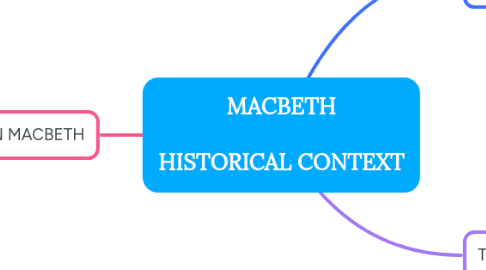
1. CONCEPTS USED IN MACBETH
1.1. The divine right of kings
1.1.1. The King is chosen by God, and defying the King is defying God. Macbeth's assassination of the King makes him a tragic hero, and King James I believed that kings are God's lieutenants and are called gods.
1.2. The idea of a tragic hero
1.2.1. War of the Roses and Macbeth depict the consequences of humanity's pursuit of power, while Shakespeare explores the internal conflict of men against evil, and the belief that God chooses the king in 17th-century ideology.
1.3. The supernatural and the portrayal of witches
1.3.1. Supernatural elements in Macbeth, such as the witches, Banquo's ghost, and the guiding dagger, heighten key scenes and underscore the play's theme of how the thirst for power can lead to inhumanity and defiance of God. The androgynous portrayal of the witches contributes to the chaos of the play's opening.
1.4. XVII century gender rules
1.4.1. Lady Macbeth's masculinity overpowers her husband's in the play, demonstrating the unnatural contrast of abandoning gender roles to gain power.
1.5. 17th century conventions and performance
1.5.1. Public theaters in the past had seating arrangements based on social status and excluded women from performing. Flying was a popular technique in religious-themed plays. Macbeth was performed for King James I in 1606, and staging conventions included soliloquys, masques, and stagecraft. Heaven and Hell were placed at opposite ends of the stage, with Earth at the center. Three types of religious plays were Mystery, Miracle, and Morality.
2. The True Story of Macbeth vs. Shakespeare's Play
2.1. Reality
2.1.1. Events lasted 17 years. Duncan was weak and ineffective. Macbeth had a legitimate right. Banquo was evil, resisting the dark side.
2.2. Shakespeare’s ‘Macbeth.’
2.2.1. Events happen in one year. Shakespeare's Duncan was wise. Macbeth kills to gain power. Banquo was humble; evil portrayal unacceptable.
3. Themes Explored in Macbeth
3.1. War-based heroism
3.1.1. mportance of power accentuated by the prolific symbols of the witches and Lady Macbeth’s role.
3.2. Superstition
3.2.1. Representative of the superstitious evil.
3.3. Corruption
3.3.1. The disruption of the Great Chain of Being heightened corruption.
3.4. Power
3.4.1. King James' fear of being overthrown or losing his power was a prominent theme.
